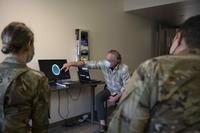The Whole Story on Getting College Credit for Military Service
Most military servicemembers and veterans have been told that they can be granted college credit for military service. However, most of us never get the whole story. Hopefully the following post will help everyone understand the opportunity and limitations associated with this highly touted, sometimes over-sold, but ultimately invaluable benefit of military service.
What are Military Experience Credits?
College credit for military experience and training is determined by the American Council on Education. ACE analyzes each MOS or Rating and associated ranks and grades to determine if the required knowledge and skills meet the academic requirements college credit. Air Force specialties are evaluated and granted credit through the Community College of the Air Force.
In addition, ACE reviews the curriculums for most military training programs, including classroom and correspondence courses, to determine the amount and level of academic credit each should be awarded. Through ACE, you can take academic credit for most of the training you have received, including Basic Training. Visit the ACE Military Programs website to see how much credit you may have earned.
ACE credits can save you time and money by eliminated some course work.
What are the limitations of Military Experience Credits?
Unfortunately, veterans like me learn the hard way that not all their ACE credits apply for their degree program. After all the recruiter told us how we can get college credit for nearly everything we do and every promotion we earn. But the Fact is, most of the ACE credits servicemembers earn only apply to lower-level (associates Degree) free-electives. Only a select handful of credits actually apply toward core requirements or upper-level course work.
The main exception is in the case of technical degrees where the veteran is seeking a degree in their actual military occupation. For example a degree in network security may fit with a veteran’s ACE credits.
In addition, it is up to each college to determine the number of credits they will accept, and how they will be applied toward a specific degree. In fact, some schools may even choose not to grant any credit for military experience. That is why it is critical to shop around for the most "military friendly" school available.
You need to ask the admissions counselor about the school’s policy for accepting ACE credit recommendations before enrolling.
Remember that not all school’s have the same policy or limitations for how to apply ACE credits. The first school I applied to told me my ACE credits didn’t count for anything. I assumed that all schools had the same policy and postponed getting my degree. It set me back seven years. Don’t make the same mistake I made – shop around.
Note: I eventually found a school that allowed me to use 22 ACE credits (upper and lower level) and accepted all my CLEP exams for college credit. It saved me a year-and-a-half of classroom time and untold dollars.
Learn more about the questions you need to ask before enrolling.



